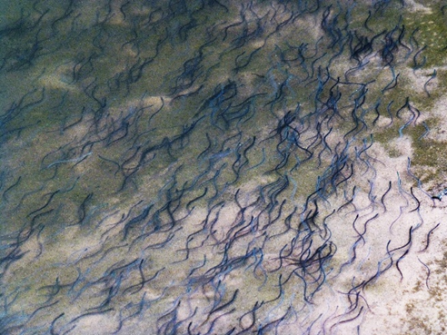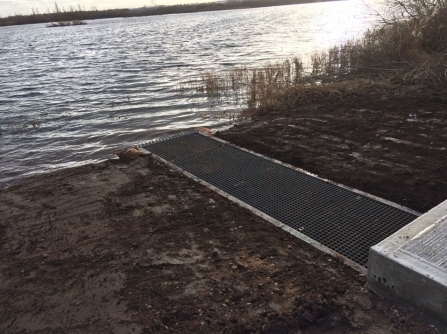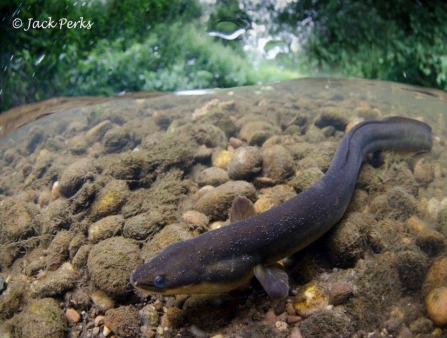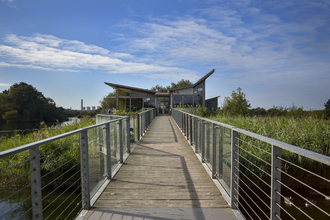
Business and Conservation Groups get together to help the critically endangered European Eel

EDF Energy has joined forces with conservation groups in the Trent valley to help migration for the critically endangered European eel.
At Idle Valley Nature Reserves near Retford, Nottinghamshire Wildlife Trust has worked with Aquatic Control Engineering to install an ‘eel pass’ to help baby eels to migrate from the River Idle into the Belmoor Lake area of the Nature Reserve.
And the Canal & River Trust has employed FishTek Consulting who are installing an eel pass on Hazelford Weir on the River Trent, between Nottingham and Newark.
Both projects were organised by the Sustainable Eel Group.
These are part of a huge programme of work which is underway across Europe to help restore eel populations by restoring wetlands and removing barriers to the eels’ migration routes. Eel passes are a bit like ladders - they help eels to swim over migration barriers.

Belmoor Lake is an ideal habitat and nursery area for eels. It has an area of 38 acres. It was previously a quarry but is now a nature reserve and prime eel habitat. The pass helps baby eels to get into the lake and adults to escape. The eels will grow there for between 5 and 20 years before migrating back to sea to spawn via the eel pass.
The River Trent has many weirs along its length, often to provide locks or to feed the canal for boat navigation. These weirs, being walls in rivers, are serious barriers to migration for fish such as salmon, trout, lampreys and eels. An eel pass at Hazelford is the first of many to come to help eels migrate into and fully populate the Trent, the second longest river in England. As part of this project, Fishtek has also prepared designs for eel passes on nearby Stoke and Gunthorpe weirs on the Trent.
Both projects will help to reverse the declining trend in eel populations in the UK and across Europe.
The European Eel, once thriving across Europe and the UK, is currently classified as ‘critically endangered’ as their numbers have declined by about 90% over the past 40 years. This is due to a number of reasons – mainly climate change, barriers to migration, destruction of wetland habitat, disease and illegal fishing and illegal exports to Asia.
Eels are an important part of the water environment. They feed on water bugs and dead and decaying animals – helping to recycle nutrients. They are also important food for otters and birds such as herons and egrets.

© Jack Perks
The European eel has an extraordinary life cycle. It starts as eggs in the Sargasso Sea near Bermuda on the other side of the Atlantic Ocean and spends 18 months floating on ocean currents towards the coasts of Europe and North Africa. It enters rivers and lakes and spends anything from 5 to 20 years feeding and growing into adult eels. It then returns to sea as a ‘silver eel’ and swims 3500 miles for over a year back to spawn in the Sargasso Sea.
Martin Cheetham, plant manager at West Burton A power station, said:
We are delighted to be able to do our bit by providing these eel passes. We have enjoyed working alongside many dedicated local partners who are all determined to support and improve the eel population.
It is fascinating to understand the role that these passes will play in opening up new habitat for eels. And I am very proud knowing that here at West Burton A along with our sister station at Cottam we are supporting these projects which will hopefully start to see a reversal of the decline in the eel’s population.”
Matt Buck, Fisheries Specialist at the Environment Agency, said: “We have worked in partnership with those involved in the construction of eel passes at Belmoor Lake and Hazelford Weir and given Environment Agency approval to both projects.
These great initiatives will increase access for eels and enable them to reach habitats suitable for them to grow, which will increase their chances of returning to the sea to spawn in subsequent years. The two projects will also benefit local biodiversity so any project which helps to boost eel numbers is an excellent development.
The construction of these passes, helping eel migration, co-incides with World Fish Migration Day on 21 April 2018.
This is a partnership project involving the following organisations:
*EDF Energy, who funded the projects
*Nottinghamshire Wildlife Trust, who own the Idle Valley Nature Reserve and organised the work at Belmoor Lake. *The Canal & River Trust who own Hazelford weir and organised the eel pass there
*The Sustainable Eel Group, who organised the projects for EDF Energy
*Aquatic Control Engineering, who designed, supplied and installed the pass at Belmoor Lake
*Fishtek Consulting, who designed, supplied and installed the pass at Hazelford Weir
*The Environment Agency, who approved the installation.

Gaps in Planning & Infrastructure Bill “deeply concerning”, say The Wildlife Trusts
Today The Wildlife Trusts have published a briefing, urging the Government to ‘fill in the blanks’ to avoid the Planning &…

Paws for Thought – then Lead by Example. Protecting Wildlife at Nature Reserves
Nottinghamshire Wildlife Trust launches its Lead by Example campaign to encourage dog owners to help protect nature by keeping their…

Wildlife Trust marks two decades since opening of iconic Attenborough Nature Centre
Nottinghamshire Wildlife Trust is celebrating 20 years since the opening of the Attenborough Nature Centre on Tuesday March 18th
